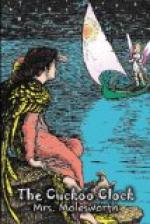His dim old eyes brightened, and for a moment he sat erect and strong.
“Do you mean the cuckoo clock?” said Sybilla, in a low voice.
“Yes, my darling, the cuckoo clock, the crowning work of my life—a clock that shall last long after I, and perhaps thou, my pretty child, are crumbling into dust; a clock that shall last to tell my great-grandchildren to many generations that the old Dutch mechanic was not altogether to be despised.”
Sybilla sprang into his arms.
“You are not to talk like that, little grandfather,” she said. “I shall teach my children and my grandchildren to be so proud of you—oh, so proud!—as proud as I am of you, little grandfather.”
“Gently, my darling,” said the old man, as he placed carefully on the table the delicate piece of mechanism he held in his hand, and tenderly embraced the child. “Kiss me once again, my pet, and then thou must go; thy little friends will be waiting.”
* * * * *
As he said these words the mist slowly gathered, again before Griselda’s eyes—the first of the cuckoo’s pictures faded from her sight.
* * * * *
When she looked again the scene was changed, but this time it was not a strange one, though Griselda had gazed at it for some moments before she recognized it. It was the great saloon, but it looked very different from what she had ever seen it. Forty years or so make a difference in rooms as well as in people!
The faded yellow damask hangings were rich and brilliant. There were bouquets of lovely flowers arranged about the tables; wax lights were sending out their brightness in every direction, and the room was filled with ladies and gentlemen in gay attire.
Among them, after a time, Griselda remarked two ladies, no longer very young, but still handsome and stately, and something whispered to her that they were her two aunts, Miss Grizzel and Miss Tabitha.
“Poor aunts!” she said softly to herself; “how old they have grown since then.”
But she did not long look at them; her attention was attracted by a much younger lady—a mere girl she seemed, but oh, so sweet and pretty! She was dancing with a gentleman whose eyes looked as if they saw no one else, and she herself seemed brimming over with youth and happiness. Her very steps had joy in them.
“Well, Griselda,” whispered a voice, which she knew was the cuckoo’s; “so you don’t like to be told you are like your grandmother, eh?”
Griselda turned round sharply to look for the speaker, but he was not to be seen. And when she turned again, the picture of the great saloon had faded away.
* * * * *
One more picture.
Griselda looked again. She saw before her a country road in full summer time; the sun was shining, the birds were singing, the trees covered with their bright green leaves—everything appeared happy and joyful. But at last in the distance she saw, slowly approaching, a group of a few people, all walking together, carrying in their centre something long and narrow, which, though the black cloth covering it was almost hidden by the white flowers with which it was thickly strewn, Griselda knew to be a coffin.




